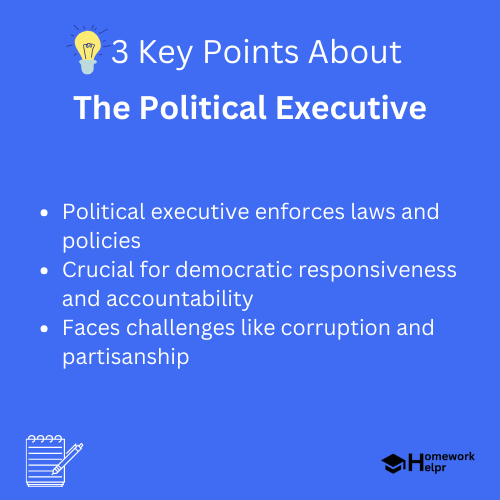📝 Summary
The political executive is essential in governance, tasked with making and enforcing laws impacting citizens’ lives. Composed of elected officials like the President or Prime Minister and Cabinet Ministers, it plays a vital role in policy formulation, law implementation, and managing foreign relations. Understanding its structure and functions highlights its significance in a democracy, fostering responsiveness and accountability. However, challenges such as corruption and partisanship threaten its integrity. Ultimately, an effective political executive strengthens the bond between the government and the public, ensuring responsive governance.
The Political Executive
The political executive is a crucial component of any government, responsible for making and implementing policies that affect the lives of citizens. This article will explore what the political executive is, its structure, functions, differences from the bureaucratic executive, and its significance in a democracy.
Understanding the Political Executive
The political executive refers to the group of individuals in a government who are responsible for making and enforcing laws. This includes individuals elected by the public or appointed based on their political expertise. The political executive is essential for maintaining order and ensuring the government’s smooth operation.
Typically, the political executive consists of:
- The President or Prime Minister: The head of the state responsible for making critical decisions.
- Cabinet Ministers: Each minister oversees specific government sectors, such as health, education, or defense.
- Advisors: They provide expert advice to the political executive in various areas.
Structure of the Political Executive
The structure of the political executive varies by country and its governance system, but it generally includes two primary components:
- Head of State: This may refer to the President in a presidential system or a monarch in a monarchy.
- Head of Government: This is often the Prime Minister, who leads the cabinet and coordinates government policies.
In some cases, the political executive can also include the legislative body, which works closely with the executive to create laws. Understanding the division of power within the political executive is essential for grasping how a government operates.

Functions of the Political Executive
The political executive has several vital functions that ensure the effective governance of a state. These functions include:
- Policy Formulation: Creating policies based on the needs and desires of the public.
- Implementation of Laws: Enforcing laws passed by the legislative body.
- Administrative Oversight: Supervising government departments and agencies to ensure efficient operation.
- Managing Foreign Relations: Conducting diplomacy and representing the state in international affairs.
Each of these functions contributes to the overall effectiveness and responsiveness of a government, making the role of the political executive indispensable.
Differences Between Political and Bureaucratic Executive
It is essential to differentiate between the political executive and the bureaucratic executive. While both play vital roles in governance, their functions and responsibilities differ significantly:
- Political Executive: Consists of elected officials who operate based on public mandate and political agendas.
- Bureaucratic Executive: Composed of appointed civil servants who implement policies and manage day-to-day operations.
Understanding this distinction helps clarify how decisions are made and executed in government settings. While political executives are accountable to the public through elections, bureaucratic executives focus on the administration’s efficiency and effectiveness.
Definition
– Bureaucracy: A system of government in which most decisions are made by state officials rather than by elected representatives. – Mandate: An official order or commission to do something, often given to elected officials by their voters.
Importance of the Political Executive in a Democracy
The political executive plays a crucial role in a democracy, serving as the bridge between the government and the citizens. Some of its significant contributions include:
- Responsiveness: It ensures that the government listens to the public’s needs and adjusts policies accordingly.
- Accountability: Elected officials are accountable to their constituents, making them more likely to act in the public interest.
- Stability: A strong political executive can provide a sense of stability and continuity in governance.
In a democracy, the political executive is vital for ensuring that the government operates according to the will of the people. By being responsive and accountable, it fosters trust and stability within the system.
❓Did You Know?
Did you know that the concept of the political executive dates back to ancient Rome, where elected officials were designated to govern and implement laws?
Challenges Facing the Political Executive
While the political executive is integral to governance, it faces numerous challenges that can hinder its effectiveness:
- Corruption: Corruption undermines trust and effectiveness in government operations.
- Partisanship: Political divisions can hinder cooperation, limiting the executive’s ability to govern effectively.
- Public Discontent: Failure to address public issues may lead to dissatisfaction with the government and its policies.
Addressing these challenges is essential for maintaining the integrity and functionality of the political executive. Robust institutions and public engagement are necessary to combat these hurdles.
Definition
– Corruption: The act of dishonest or unethical behavior by those in power, typically involving bribery. – Partisanship: Strong, often blind allegiance to a particular political party, which can impact governance and decision-making.
Conclusion
The political executive is a vital part of modern governance, responsible for implementing policies and maintaining the relationship between citizens and the state. Understanding its structure, functions, and significance allows citizens to better engage with their government.
Despite facing challenges such as corruption and partisanship, a strong and accountable political executive can promote stability and responsiveness in a democracy. Active participation in the political process ensures that the voices of citizens are heard, fostering a government that truly serves its people.
Related Questions on The Political Executive
What is the political executive?
Answer: It consists of elected officials responsible for governance.
Who leads the political executive?
Answer: The President or Prime Minister typically leads it.
What are key functions of the political executive?
Answer: Policy formulation, law enforcement, and administrative oversight.
What challenges does the political executive face?
Answer: Challenges include corruption, partisanship, and public discontent.
